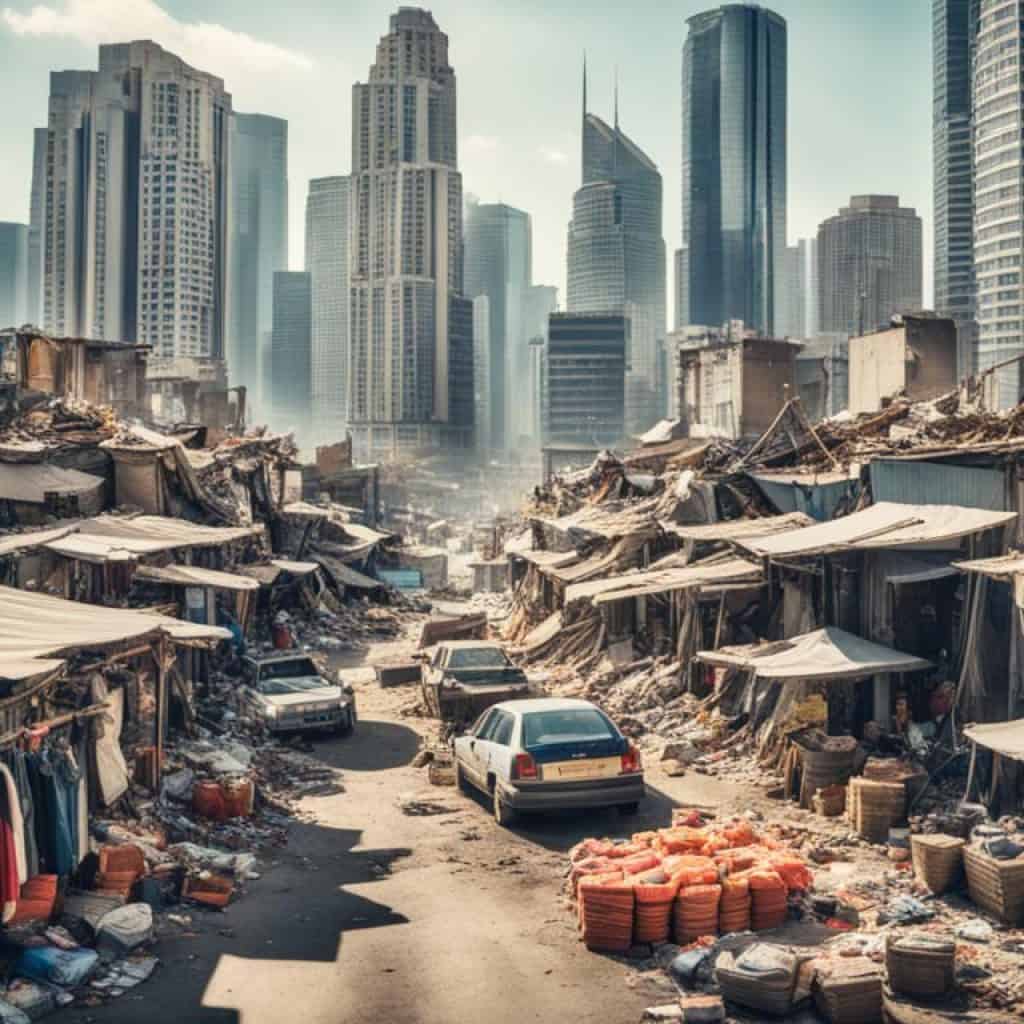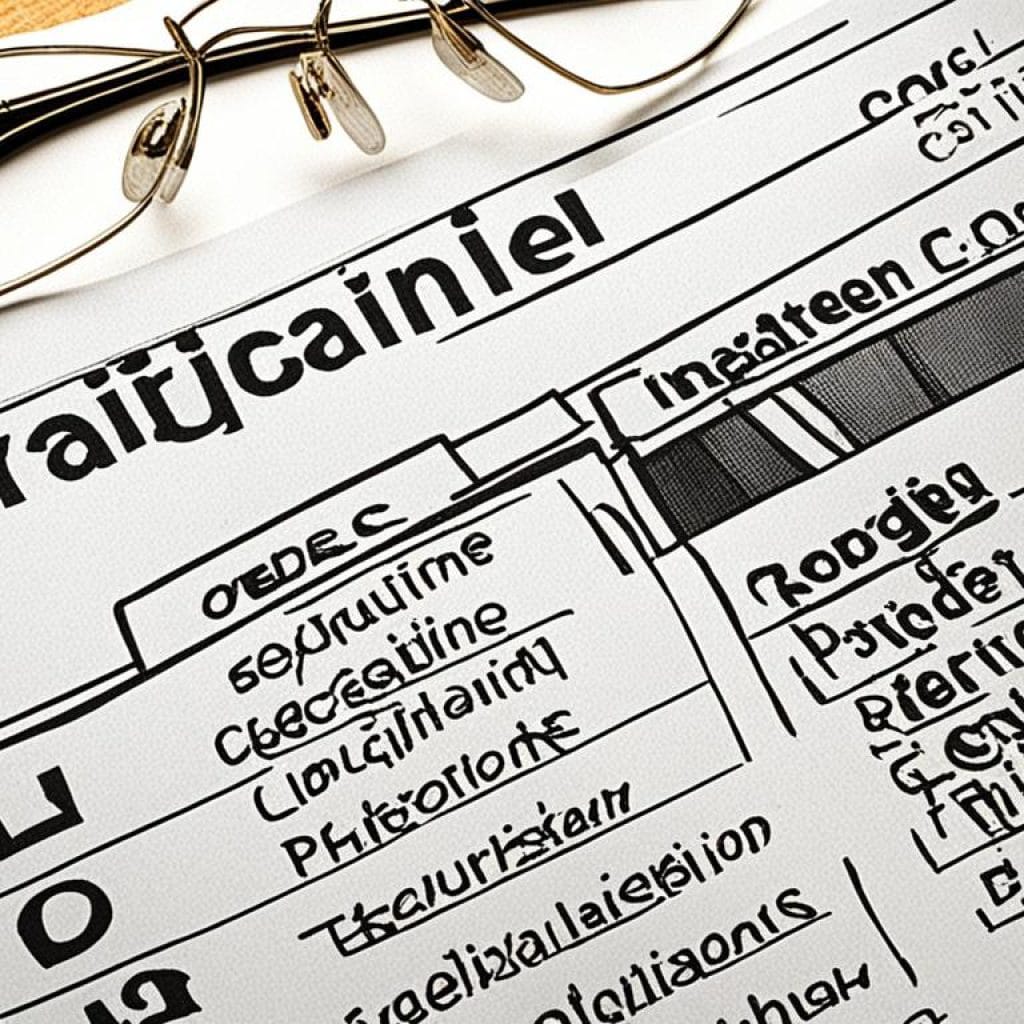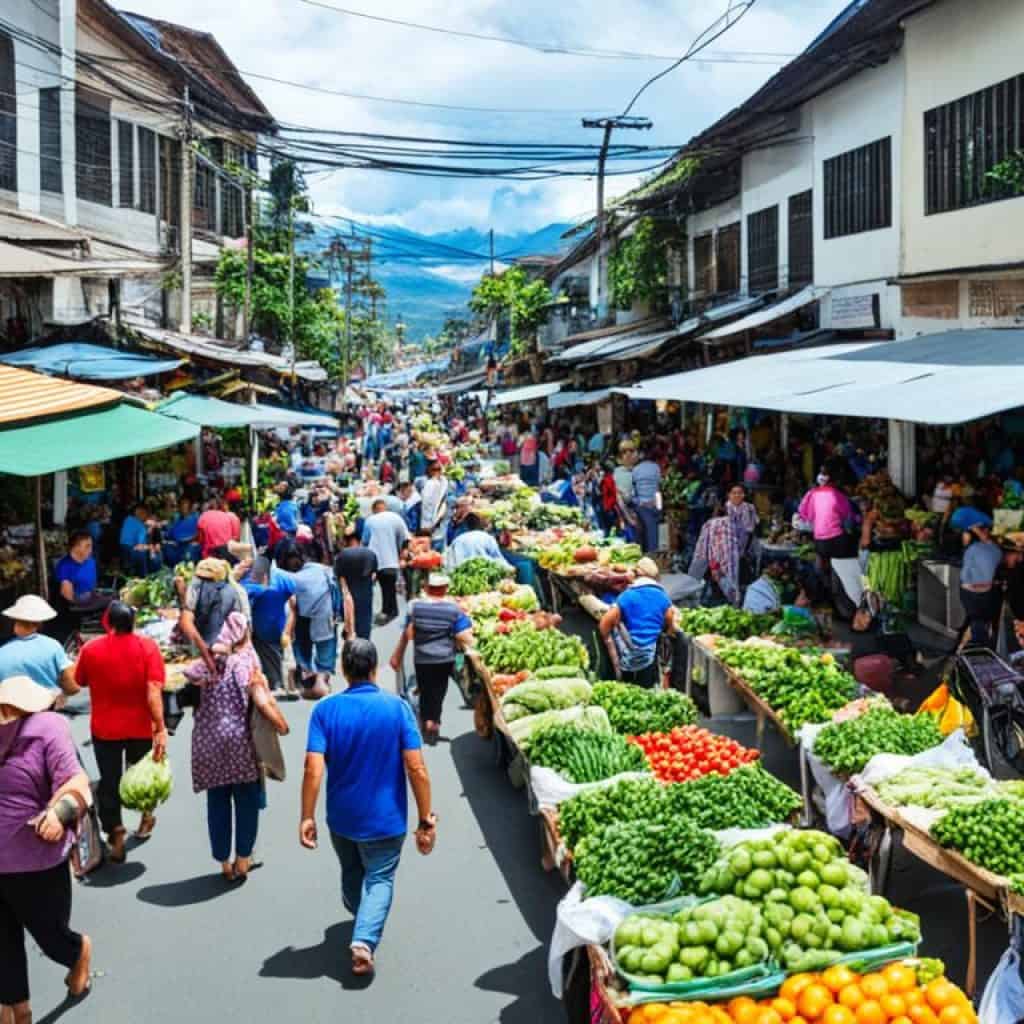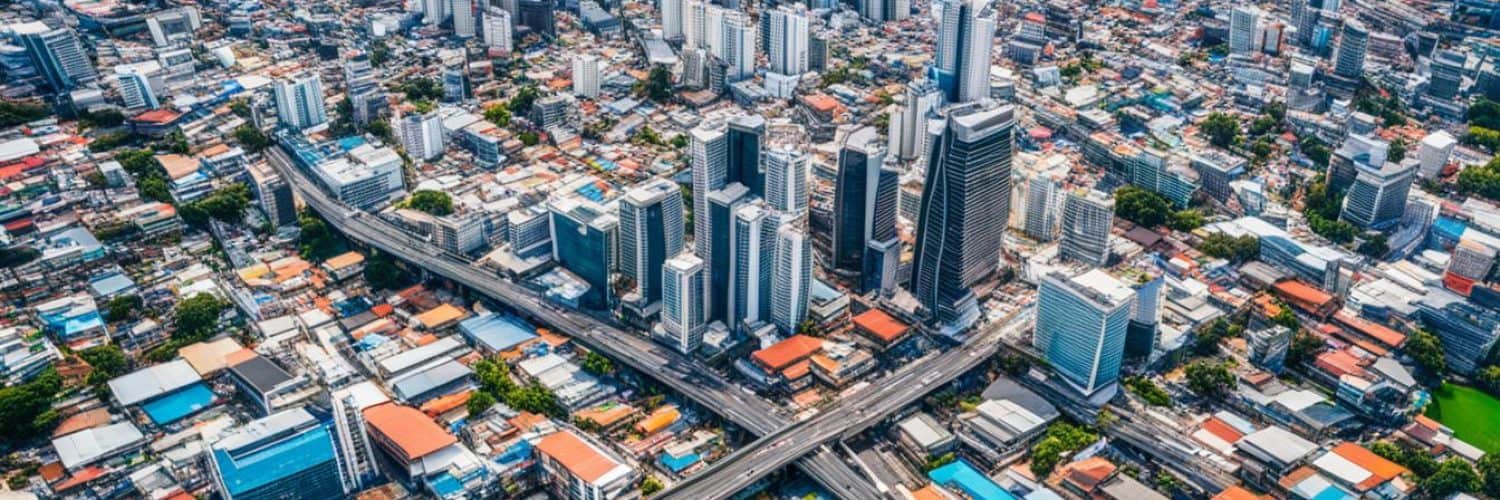Have you ever wondered how the Philippine economy functions? What factors shape its growth and development? It’s time to dive into the intricacies of the Philippine economic system and explore the unique blend of private freedom and centralized planning that drives the country’s progress.
Key Takeaways:
- The Philippine economic system combines elements of private freedom and centralized planning.
- The country has experienced steady economic growth supported by development initiatives and international collaboration.
- The Philippines offers a favorable business environment and investment climate.
- Efforts are ongoing to strengthen governance, rule of law, and social protection.
- Disaster risk management and community development play crucial roles in the economic system.
Economic Growth and Development Initiatives
The Philippines has been experiencing consistent economic growth in recent years, thanks to a range of development initiatives. These initiatives have been supported by the World Bank, and they have played a vital role in addressing key challenges and promoting inclusive growth in the country.
One noteworthy project is the Philippines COVID-19 Emergency Response Project, which has played a crucial role in the nation’s fight against the pandemic. This project has enabled the Philippines to ramp up its vaccination efforts, strengthen its healthcare systems, and mitigate the impact of the global health crisis. By facilitating vaccine procurement and distribution, the project has benefited millions of children and contributed to economic recovery.
Furthermore, the Philippines Beneficiary FIRST Social Protection Project aims to enhance the country’s social protection delivery system. The project supports the government’s conditional cash transfer program, which targets vulnerable populations. Through this initiative, the government can provide financial support to low-income households, thereby improving their well-being and contributing to overall economic development.
These development initiatives demonstrate the Philippines’ commitment to fostering economic growth and sustainable development. By addressing pressing issues and implementing strategic projects, the country is paving the way for a more prosperous future.
| Economic Growth Initiatives | Impact |
|---|---|
| Philippines COVID-19 Emergency Response Project | Scaling up vaccination efforts, Strengthening health systems, Overcoming the impact of the pandemic |
| Philippines Beneficiary FIRST Social Protection Project | Enhancing social protection delivery system, Supporting conditional cash transfer program, Improving well-being of vulnerable populations |
Business Environment and Investment Climate
The Philippines offers a favorable business environment and investment climate for both domestic and foreign investors. The country has made significant efforts to streamline the business regulatory environment, reducing the time and cost involved in licensing. Foreign investment is welcomed, and the investment code treats foreign investors the same as domestic investors. Despite some challenges, such as labor market rigidity, the Philippines remains an attractive destination for investment, with abundant opportunities for growth and development.
Foreign businesses can enjoy a range of benefits when investing in the Philippines, including:
- Strategic location in Southeast Asia, providing access to emerging markets in the region.
- Skilled and English-speaking workforce, with a strong service-oriented culture.
- Competitive cost structure and incentives for investors.
- Booming sectors, such as business process outsourcing, tourism, and manufacturing.
The government has also implemented measures to promote ease of doing business in the country. The Philippines has improved its ranking in the World Bank’s Ease of Doing Business Index, reflecting its commitment to creating a conducive environment for business growth. It is worth noting that the investment climate continues to evolve, and the government is continually implementing reforms to attract more investments.
Furthermore, the Philippines offers various investment incentives, including tax incentives, special economic zones, and competitive labor costs. These incentives aim to attract foreign direct investment and support the growth of key industries. The government is actively engaged in promoting investment and has established agencies such as the Philippine Economic Zone Authority (PEZA) and the Board of Investments (BOI) to facilitate and support investors throughout the investment process.
Investment Opportunities
The Philippines boasts a diverse range of investment opportunities across various sectors. Some of the key sectors that offer attractive investment potential include:
- Information technology and business process management (IT-BPM)
- Tourism and hospitality
- Manufacturing and industrial parks
- Renewable energy
- Infrastructure development
These sectors have been identified as priority areas by the government, with policies and initiatives in place to promote investment and foster growth. By investing in these sectors, businesses can capitalize on the Philippines’ growing economy and vibrant market.
Investment Protection
The Philippines recognizes the importance of protecting investments and ensuring a secure business environment. The country has taken steps to strengthen intellectual property rights protection and enforce laws against unfair competition. In addition, the government has established mechanisms for the resolution of investment disputes, providing investors with avenues for seeking redress in case of any disputes or conflicts.
Foreign Direct Investment (FDI) Inflows in the Philippines
| Year | FDI Inflows (in millions of USD) |
|---|---|
| 2016 | 8,733 |
| 2017 | 10,049 |
| 2018 | 9,802 |
| 2019 | 7,651 |
| 2020 | 6,541 |
Note: The table presents the FDI inflows in the Philippines from 2016 to 2020. The data reflects the resilience of the Philippine economy, even amidst global uncertainties and challenges.
Economic Policies and Challenges
The Philippine government is committed to implementing a range of economic policies aimed at promoting stability and sustainable growth in the country. These policies target key areas such as tax burden, government spending, regulatory efficiency, and open markets. By addressing these aspects, the government aims to create an enabling environment for businesses to thrive and for the economy to flourish.
However, as with any economic system, the Philippines also faces a set of challenges that need to be overcome. One of the main challenges is the weak overall rule of law, which affects the business environment and investor confidence. Issues related to property rights and judicial effectiveness further compound these challenges.
The Philippine government recognizes these obstacles and is actively working to address them. Efforts are underway to strengthen the rule of law, enhance property rights protection, and improve the effectiveness of the judicial system. By doing so, the government aims to create a more transparent, secure, and predictable business environment, fostering greater investor trust and attracting domestic and foreign investment.
“The Philippine government is dedicated to enhancing the rule of law and addressing the challenges hindering economic development. By strengthening property rights, improving the judicial system, and promoting transparency, we can create a favorable environment for businesses to thrive and ensure sustained economic growth.”
Despite the challenges, the Philippine government’s commitment to implementing effective economic policies and addressing key obstacles demonstrates its determination to strengthen the economic system in the country. Through continuous efforts and reforms, the government aims to build a resilient economy that benefits both businesses and the Filipino people.
Economic Challenges in the Philippines
| Challenges | Impact |
|---|---|
| Weak overall rule of law | Undermines investor confidence and hampers business growth |
| Property rights issues | Deters investment and hinders economic development |
| Judicial effectiveness | Affects contract enforcement and delays legal proceedings |
The Philippine government is actively working to address these challenges through comprehensive reforms and targeted initiatives. By focusing on improving the rule of law, protecting property rights, and enhancing judicial effectiveness, the government aims to create a conducive environment for economic growth and development.

Government Integrity and Rule of Law
The rule of law and government integrity are fundamental pillars of a well-functioning economic system. In the Philippines, there is a growing recognition of the importance of these principles and ongoing efforts to promote transparency, accountability, and good governance.
However, it is essential to acknowledge that the country still faces challenges in terms of property rights, judicial effectiveness, and government integrity. The Philippines scores below the world average in these areas, indicating the need for continuous improvement to ensure a robust legal framework and a trustworthy government.
The government is actively working to address these issues and strengthen the overall rule of law. By implementing reforms, enhancing enforcement mechanisms, and promoting ethical practices, the Philippines aims to create a more transparent and accountable system that fosters trust and confidence in both domestic and international stakeholders.
“A strong rule of law is essential for sustainable economic development and investor confidence.” – President Rodrigo Duterte
Efforts are being made to streamline legal processes, improve access to justice, and strengthen the effectiveness of the judiciary. Additionally, initiatives are underway to enhance government integrity through measures such as anti-corruption campaigns, public sector reforms, and the promotion of ethical behavior among public officials.
The Philippines recognizes that government integrity and the rule of law are crucial for attracting investments, encouraging entrepreneurship, and fostering a conducive business environment. By prioritizing these areas, the country aims to create a level playing field, protect property rights, and ensure fair and efficient dispute resolution.
It is important for the government, private sector, civil society, and citizens to work together in upholding government integrity and the rule of law. By fostering a culture of accountability, transparency, and ethical behavior, the Philippines can strengthen its economic system and build a foundation for sustainable growth and development.
Key Points:
- The Philippines scores below the world average in property rights, judicial effectiveness, and government integrity.
- The government is actively working to strengthen the overall rule of law and improve governance.
- Efforts include streamlining legal processes, enhancing enforcement mechanisms, and promoting ethical practices.
- Government integrity and the rule of law are crucial for attracting investments and fostering a conducive business environment.
- A culture of accountability, transparency, and ethical behavior is essential for sustainable growth and development.
Government Size and Fiscal Health
The government size and fiscal health of the Philippines are crucial factors in the country’s economic system. It is essential for the government to manage its finances effectively to ensure fiscal stability and promote sustained economic growth and development. Let’s take a closer look at the key indicators:
| Tax Burden | Government Spending | Public Debt |
|---|---|---|
| 17.9% of GDP | 24.9% of GDP | 57.0% of GDP |
The tax burden in the Philippines amounts to 17.9% of GDP. This includes various taxes imposed on individuals, businesses, and goods and services. The government spending averages 24.9% of GDP, reflecting the allocation of funds for public services, infrastructure development, and social programs. However, it is crucial to note that public debt stands at 57.0% of GDP, highlighting the need for effective management and planning to ensure sustainable finances.
By maintaining fiscal health and managing government size, the Philippines can create a stable economic environment that supports long-term growth and development. The government’s efforts to address financial challenges and promote fiscal stability are vital for economic prosperity.
Regulatory Efficiency and Market Freedom
In order to foster business growth and attract investment, the Philippines places a strong emphasis on regulatory efficiency and market freedom. The government has taken significant steps to streamline the business regulatory environment, reducing both the time and cost associated with licensing requirements. This streamlined approach allows businesses to operate more efficiently and effectively, promoting economic growth and development.
The country also actively promotes trade freedom, creating an environment that welcomes foreign investment. The Philippines recognizes the importance of international trade in driving economic expansion and embraces policies that facilitate cross-border transactions. By reducing barriers to trade, the country enhances market access for businesses, enabling them to expand their customer base and explore new opportunities.
However, while significant progress has been made in regulatory efficiency and trade freedom, there are still areas that require improvement. Labor freedom and capital market development are two aspects that need further attention in order to fully optimize the business environment in the Philippines. Addressing these areas will help create a more favorable landscape for both domestic and foreign investors.
| Highlighted Areas | Current Status |
|---|---|
| Labor Freedom | Requires further development to enhance flexibility and efficiency in the labor market. |
| Capital Market Development | Needs expansion and improvement to support business financing and investment opportunities. |
Strengthening labor freedom will enable businesses to adapt more swiftly to changing market demands, fostering competitive advantages and promoting job creation. Additionally, enhancing capital market development will provide businesses with greater access to funding options, facilitating their growth and expansion.
Overall, the Philippines’ commitment to regulatory efficiency and market freedom underscores its determination to create a business-friendly environment that fosters economic growth and attracts investment. By continuously working towards improvements in labor freedom and capital market development, the country positions itself for greater success in the global marketplace.

Economic Indicators and International Rankings
The Philippine economy utilizes various indicators and rankings to evaluate its performance and position on the global stage. One key indicator is the country’s Gross Domestic Product (GDP) growth rate, which provides insights into the overall economic health and progress.
Furthermore, international rankings compiled by reputable organizations shed light on the business and investment climate in the Philippines. For instance, the World Bank’s Ease of Doing Business Index assesses factors such as starting a business, obtaining permits, and enforcing contracts. This index assists policymakers, investors, and entrepreneurs in identifying areas that require improvement and highlighting the country’s strengths.
The Heritage Foundation’s Index of Economic Freedom is another influential ranking that evaluates various pillars of economic freedom, including rule of law, government integrity, and regulatory efficiency. The Philippines’ placement in this index provides an indication of its commitment to fostering an environment conducive to business and investment.
Monitoring these economic indicators and international rankings allows stakeholders to gain a comprehensive understanding of the Philippine economic system’s progress, identifying areas for development and potential investment opportunities.
| Economic Indicator | Data | Ranking |
|---|---|---|
| GDP Growth Rate | X% | N/A |
| World Bank Ease of Doing Business Index | N/A | X |
| Heritage Foundation Index of Economic Freedom | N/A | X |
Economic Indicators and Rankings:
- GDP growth rate provides insights into economic performance
- World Bank’s Ease of Doing Business Index evaluates the business environment
- Heritage Foundation’s Index of Economic Freedom measures economic liberty
“Monitoring economic indicators and international rankings is crucial for understanding the progress and potential of the Philippine economic system.”
Development Projects and Results
The World Bank has played a significant role in supporting development projects in the Philippines. These projects have yielded positive results and made a difference in the lives of the Filipino people.
“The impact of international collaboration and support is evident in the success of these development projects.”
One notable project supported by the World Bank is the Philippines COVID-19 Emergency Response Project. This initiative has provided crucial assistance in the country’s efforts to combat the pandemic. It has supported national vaccination efforts and strengthened the health systems, contributing to the overall well-being of the Filipino population.
The Beneficiary FIRST Social Protection Project is another remarkable endeavor backed by the World Bank. This project aims to enhance the social protection delivery system in the Philippines, focusing on benefiting the most vulnerable populations. It has been instrumental in providing support to those in need and creating a safety net for the disadvantaged segments of society.
Key Results
The development projects supported by the World Bank in the Philippines have achieved notable results, contributing to the country’s economic development and social well-being. Some key outcomes include:
- Significant progress in national vaccination efforts, enabling the Philippines to effectively mitigate the impact of the pandemic.
- Strengthened health systems and improved access to quality healthcare services.
- Enhanced social protection delivery system, benefiting the most vulnerable populations.
- Reduced poverty and improved overall well-being of the Filipino people.
- Promoted inclusive growth and economic resilience.
These achievements demonstrate the positive impact of international collaboration and the effectiveness of development projects in driving positive change in the Philippines.
| Project | Focus | Results |
|---|---|---|
| Philippines COVID-19 Emergency Response Project | Healthcare and Vaccination | Strengthened health systems, supported vaccination efforts, and helped mitigate the impact of the pandemic. |
| Beneficiary FIRST Social Protection Project | Social Protection | Enhanced the social protection delivery system, benefiting the most vulnerable populations and reducing poverty. |
Social Protection and Poverty Reduction
The Philippines has implemented social protection programs to address poverty and provide assistance to vulnerable households. One of these programs is the Pantawid Pamilyang Pilipino Program (4Ps), a conditional cash transfer program that aims to invest in the education and health of children from low-income households.
The 4Ps program has had a significant impact on poverty reduction and food insecurity among its beneficiaries. By providing cash grants to eligible families, the program ensures that children receive proper nutrition and have the opportunity to attend school. This targeted assistance helps break the cycle of poverty and empowers families to build a better future.
The success of the 4Ps program has led to its continuous improvement and expansion, reaching more households in need. It is a crucial part of the Philippine government’s efforts to provide social protection and uplift marginalized communities.
“The Pantawid Pamilyang Pilipino Program has made a real difference in the lives of Filipino families. By investing in education and health, we are investing in the future of our nation. Through social protection initiatives like the 4Ps program, we can break the chains of poverty and create a more inclusive society.” – Secretary of Social Welfare and Development
Building on the success of social protection programs, the Philippines is committed to further reducing poverty and promoting sustainable development. By addressing the needs of the most vulnerable populations, the country is taking significant strides towards achieving its poverty reduction goals.
Key Benefits of the 4Ps Program:
- Reduces poverty and food insecurity among vulnerable households
- Invests in the education and health of children
- Breaks the cycle of poverty by empowering families

Through effective social protection programs like the 4Ps, the Philippines is making a positive impact on poverty reduction and improving the lives of its citizens. By providing targeted support to those in need, the country is working towards creating a more equitable and prosperous future for all.
Community Development and Local Governance
Community development and local governance play crucial roles in the economic system of the Philippines. These initiatives empower the community and promote inclusivity, ensuring that all members have access to basic services and resources. One notable project is the Kapit-Bisig Laban sa Kahirapan – Comprehensive and Integrated Delivery of Social Services (Kalahi CIDSS), which focuses on supporting poor and disaster-affected communities to participate in local planning.
Through Kalahi CIDSS, communities are given the opportunity to identify their needs and prioritize projects that will address their specific challenges. This approach fosters a sense of ownership and partnership between the community and the local government units.
Kalahi CIDSS is a powerful example of how empowering local communities can lead to sustainable development and improved economic outcomes. By actively involving the community in decision-making processes and addressing their needs, we create a stronger and more resilient society.
Enhancing Local Governance through Engagment
Engagement between local government units and communities is essential for effective local governance. It promotes transparency, accountability, and the efficient allocation of resources. By incorporating the voices and perspectives of community members, local government units can better understand the challenges and opportunities within their jurisdiction.
- Increased collaboration and communication to address community needs
- Shared responsibility and decision-making processes
- Improved delivery of public services
- Sustainable and inclusive development
Impact of Community Development and Local Governance
| Benefit | Explanation |
|---|---|
| Improved access to basic services | Community-driven development projects address gaps in infrastructure, education, healthcare, and other essential services. |
| Social cohesion and empowerment | Engagement and participation of community members foster a sense of belonging, ownership, and empowerment. |
| Enhanced disaster resilience | Disaster-affected communities are better prepared and equipped to mitigate and respond to natural hazards. |
| Economic growth and poverty reduction | Investing in community development leads to job creation, increased income, and improved living conditions, ultimately reducing poverty. |
By focusing on community development and strengthening local governance, the Philippines is paving the way for a more inclusive, sustainable, and prosperous future. These initiatives are vital in fostering social cohesion, reducing disparities, and creating an enabling environment for economic growth.
Disaster Risk Management and Preparedness
In the Philippines, the challenge of natural disasters and climate risks is ever-present. The government has taken proactive measures to strengthen disaster risk management and preparedness, recognizing the importance of protecting communities and minimizing the impact of such events. Through various initiatives and programs, the Philippines is working toward building resilient communities that are ready to face and recover from disasters.
Ready to Rebuild (R2R) Program
The Ready to Rebuild (R2R) program is a vital component of disaster risk management in the Philippines. It focuses on empowering communities to anticipate the impacts of disasters and develop comprehensive recovery plans. By training individuals within these communities, the R2R program equips them with the knowledge and skills needed to respond effectively in times of crisis. This community-driven approach provides a sense of ownership and resilience, strengthening the overall disaster response and recovery process.
Technical Assistance and Tools
Technical assistance and tools play a crucial role in enhancing the government’s capacity to manage risks and integrate climate and disaster risk information. By leveraging technology and data-driven solutions, the Philippines can make informed decisions and develop effective strategies to mitigate the effects of disasters. These tools facilitate early warning systems, risk assessments, and disaster mapping, enabling authorities to plan and respond swiftly to potential threats.
“Building resilience requires proactive measures that empower individuals and communities to respond and recover quickly from disasters.”
Disaster risk management and preparedness are ongoing efforts, driven by the collective commitment of government agencies, civil society organizations, and the Filipino people. The Philippines understands that investing in disaster risk reduction is crucial for long-term sustainable development and safeguarding the well-being of its citizens.
| Benefits of Effective Disaster Risk Management | Impact |
|---|---|
| Reduced loss of lives and property | Protecting communities and ensuring their safety |
| Enhanced economic stability | Promoting sustainable development and resilience |
| Improved disaster response and recovery | Minimizing the impact of disasters and restoring communities |
| Increased community participation and empowerment | Encouraging a sense of ownership and resilience |
Conclusion
The economic system in the Philippines is a unique combination of private freedom, centralized planning, and government regulation. Despite the challenges faced by the country, notable initiatives have been implemented to foster economic growth, enhance the business environment, and address social issues. International collaboration, particularly with the support of the World Bank, has played a crucial role in driving development projects and improving the overall economic system.
Efforts to strengthen governance, the rule of law, and social protection remain vital for ensuring the Philippines’ sustainable growth and development. By focusing on these areas, the country can create a more transparent and accountable system. Continued investment in education and healthcare, coupled with the promotion of inclusive policies and programs, will contribute to poverty reduction and the overall well-being of the Filipino people.
The Philippines’ commitment to streamlining the business regulatory environment and welcoming foreign investment positions it as an attractive destination for both local and international entrepreneurs. However, there are areas that still require attention, such as labor market rigidity and capital market development. By addressing these challenges, the country can further enhance its business environment and promote greater market freedom.
In conclusion, the economic system in the Philippines is a work in progress, with ongoing efforts to foster economic growth, improve governance, and address social and environmental challenges. Through collaboration, innovation, and continued commitment to development initiatives, the Philippines is poised for sustained progress and a brighter future.


















Add comment